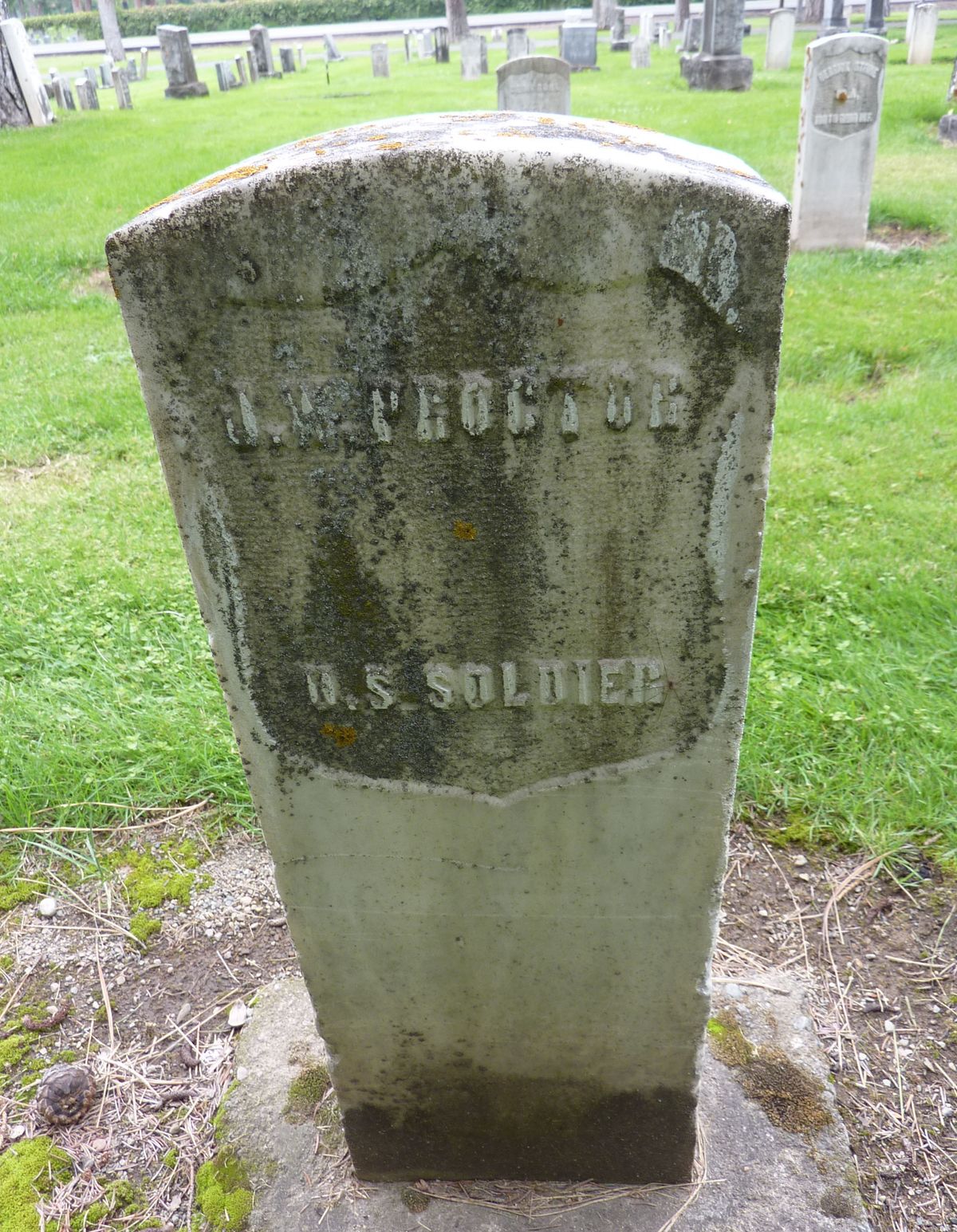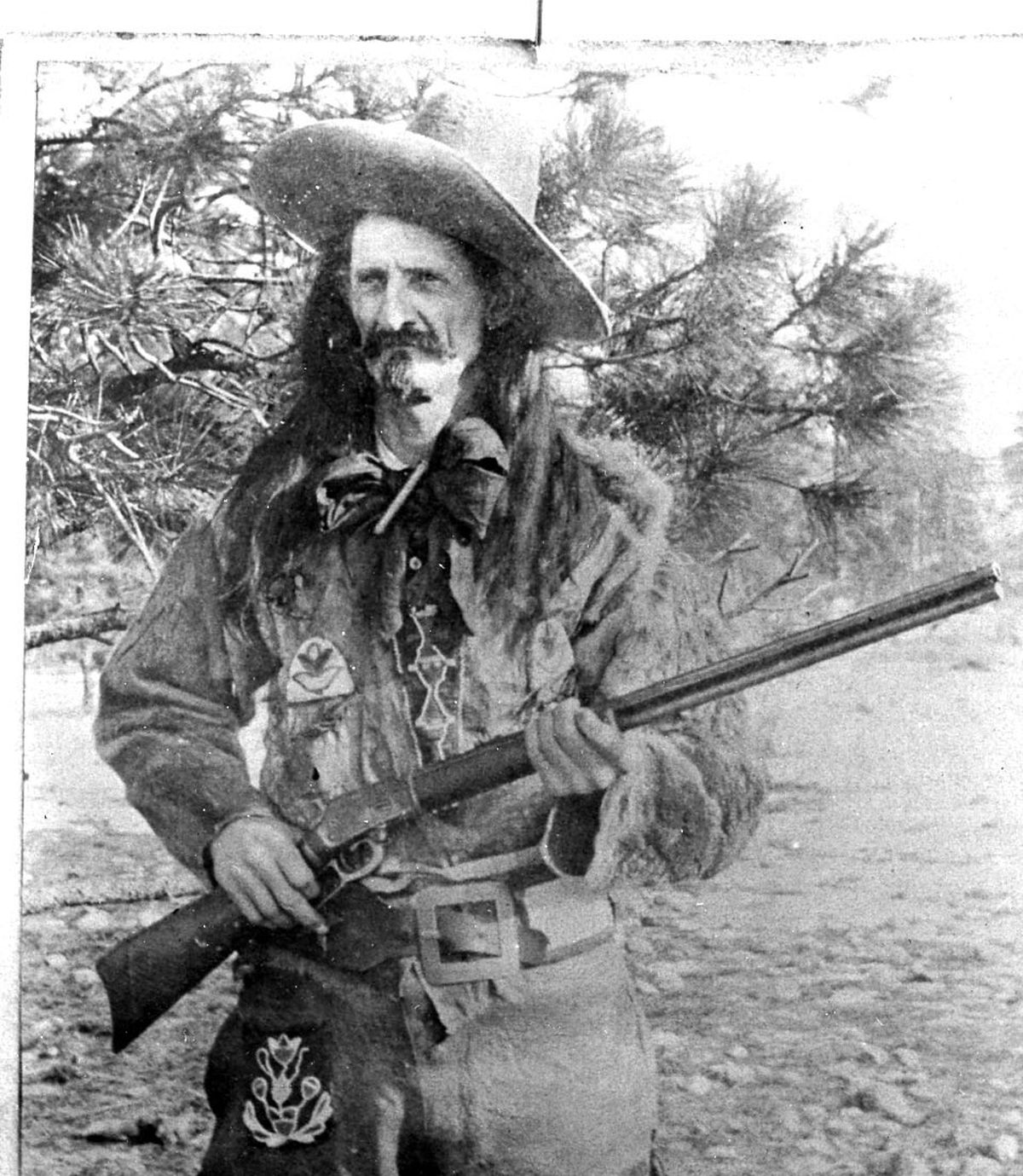Tombstone belies J.W. Proctor’s adventurous life
A simple gravestone in memory of J.W. Proctor at Greenwood Memorial Terrace.
The gravestone at Greenwood Memorial Terrace with the fading lettering – “J.W. Proctor, U.S Soldier” – gives no hint about the interesting life of the 6-foot-6-inch, 190-pound gentle giant who lies beneath, a true character who inhabited Spokane in the late 1800s, striding about in his buckskin clothing, broad-brimmed white hat and general frontier attire.
Nor does it indicate that John W. Proctor was known far and wide as Death-on-the-Trail or Death-on-Trail. That fierce-sounding name belied who Proctor was, a man who was described as generous to a fault and helpful to all. According to written accounts, he embraced the word “death” in its slang meaning as being proficient in one’s expertise, as in a dedicated physician who might be considered death on tuberculosis, for example.
And Proctor was quite an expert on the trail. Born in Indiana around 1843, he fought with the Union Army and began migrating westward after the Civil War. He scouted along the Missouri River and in the Dakotas, where it was written that he was the “original locator of Bismarck,” though that is unsubstantiated.
He was a scout in the Black Hills for Gen. George Custer during the Sioux wars. In one newspaper account, a deputy sheriff recalled that Proctor was involved in Custer’s “last campaign against the warlike Indians in that country,” and that his extensive scouting in that region made him “one of the most successful men in that branch of the service,” according to the deputy.
After those days, he prospected in many locations – including the Pend Oreille and Coeur d’Alene districts, and had mining claims throughout the country. He and his wife, who was part Chippewa, separated, and she located with their two children to Idaho. He migrated to Spokane, where he was well-known in the area for his proficiency as a prospector and as a guide for other prospectors and hunting parties – and for his attire. It was as if he were Spokane’s local Buffalo Bill, but without the bravado and P.R.
At one time his net worth was about $150,000, a considerable fortune at the time, but he lost most of it during hard times in the mid-1880s. Even so, he took 25 to 30 down-on-their-luck people into his own home, some of whom he found sleeping on the streets.
He had a small home in Peaceful Valley and also owned a few others, which he rented at a modest cost to those in need.
Perhaps one of the most interesting things about him was his various recognized skills – an expert boxer, excellent shot and at one time an organizer of a Wild West show (and had his own buffalo in the show) – and also for his apparent expertise in forensics.
A newspaper account in July 1893 tells of a human skull and bones found on a steep hillside in Peaceful Valley near the foot of Oak Street. There were questions that the previous owner of the property, an older man whose whereabouts could not be verified, might have been murdered, especially since the current owners had been acting irregularly. Proctor was a neighbor.
The article states: “Death-on-Trail unhesitatingly pronounces it a white man’s skull which may have been buried four or five years.” What he said appeared to carry enough weight that it was deemed worthy of inclusion in the account of how the bones were being investigated.
Proctor died on Jan. 1, 1897, while prospecting with two men from Spokane. They were locating claims near Mineral Point, 10 miles outside Hope, Idaho, when a rockslide carried him 200 feet to his death.
He was not one of Spokane’s founding fathers, nor a land developer or other such famous person. He was a colorful character and a beloved personality whose death merited a huge story in The Spokesman-Review on Jan. 2, 1897, in which Death-on-the-Trail was described as a good-natured “whole souled adventurer.”
A friend said he “never heard of his doing a dishonorable act.” Not a bad epitaph.

